Rivers and our future
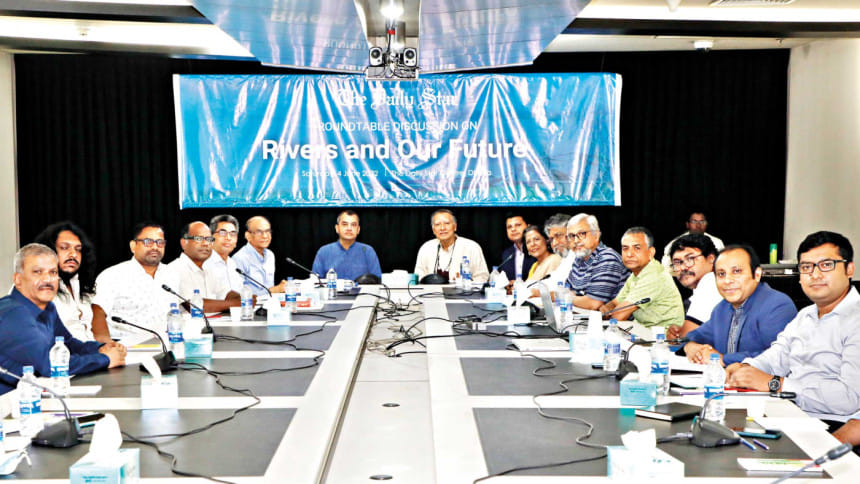
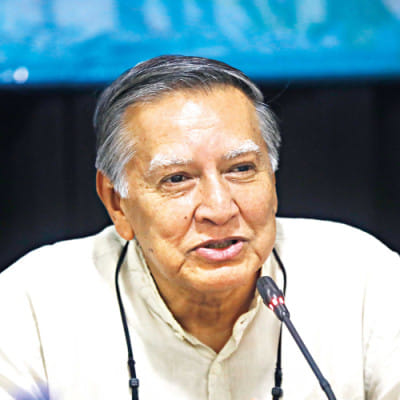
Mahfuz Anam, Editor & Publisher, The Daily Star
Rivers are one of the most important resources of Bangladesh. Unfortunately, we have proved ourselves as a short-sighted nation by not taking care of these invaluable resources. Many voices have been raised and many media outlets have expressed the urgency of saving our rivers, but no significant change has happened.
I was ecstatic when the High Court issued a directive to demarcate the rivers, thinking it was an epoch-making directive for the conservation of rivers. In reality, it appeared to be a curse instead of a blessing as the demarcation pillar legitimised river-grabbing.
The Daily Star has been very vocal about protecting the rivers in Bangladesh. We will continue our efforts in this regard. I would like to request you all to put forward your suggestions on how the rivers in Bangladesh can be saved.

Mohammad Golam Sarwar, Assistant Professor, Department of Law, Dhaka University
In 2011, the government amended the Constitution and inserted Article 18A which states, "The State shall endeavour to protect and improve the environment and to preserve and safeguard the natural resources, bio-diversity, wetlands, forests and wild-life for the present and future citizens." It highlights the importance of intergenerational equity and sustainability.
Bangladesh Environment Conservation Act 1995 was also amended in 2010, and a clause was added to protect water reservoirs. The clause states, "It is prohibited to fill the land or change the class by other means which is already specified as water reservoir." However, there is an exception on the grounds of "national interest". What constitutes "national interest" is not clearly defined in the law. There are ample examples of grabbing and filling water reservoirs by exploiting this exception.
Bangladesh Water Act 2013 is a comprehensive piece of legislation that aims to integrate and coordinate water resource management in the country. This law stipulates, "All rights over the water within the state territory shall, on behalf of the people, be vested upon the State." This is contradictory to the international human rights law which recognises the people as the right-holders and the State as the duty-bearer.
The National River Conservation Commission Act of 2013 is the most relevant law for protecting the rivers. But the Act has turned the Commission into a mere recommending body which does not have any enforcing and monitoring authority. The Draft National River Conservation Commission Act of 2020 has many loopholes that need to be addressed seriously.
The High Court Division of the Supreme Court of Bangladesh delivered a historic judgement declaring rivers as a legal entity and assigning the government as the legal trustee in protecting the rights of waterbodies. The judgement also directed to empower National River Conservation Commission. The judgement identified river encroachment and river pollution as criminal offences and directed for establishing a separate trial process to ensure speedy disposal of these cases.
The most challenging aspect of our environment-related laws is that these laws give enormous power to the executive without ensuring an effective accountability mechanism. These laws also contain provisions to save the officials in the name of good faith. However, there is no clear definition of what constitutes 'good faith'.
According to Bangladesh Environment Conservation Act and Bangladesh Environment Court Act, no environment court shall take cognizance of an offence except on the written report of an Inspector of Department of Environment. This provision restricts a person's access to the court. As a result, the number of cases in our environment courts is still very low.
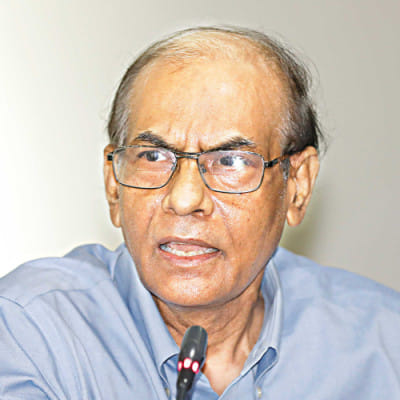
Dr. Muzibur Rahman Howlader, Former Chairman, National River Conservation Commission (NRCC)
The Water Development Board has the power as a prosecuting agency, but the problem is that they have not filed any case against any river-grabber so far. The Parliament has given the executive branch enough authority to take initiatives to save the rivers, but the government officials are not interested in stepping in. Therefore, building institutional capacity is crucial. We also have to ensure the accountability of the institutions that are responsible for protecting the rivers. There must be a strong political will to protect the rivers. National River Conservation Commission needs to be strengthened through allocation of adequate human and financial resources. We undertook a massive campaign across the country to make people aware of the importance of protecting rivers. Unfortunately, we could not continue due to a shortage of funds.
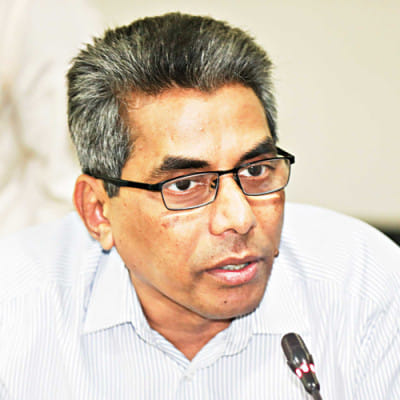
Malik Fida A Khan, Member, National River Conservation Commission (NRCC)
Three major problems regarding our rivers are grabbing, pollution, and maintaining navigability. The impact of climate change is another big issue, especially in the coastal areas. As far as the solution is concerned, we have to think from a regional perspective, since we have 54 international rivers with India and three rivers with Myanmar. In 2011, a framework agreement was signed between Bangladesh and India which stipulated that the two countries would focus on river basin organisation. However, we could not make any progress in this regard. The water quality of the transboundary rivers is crucial for us, and we have to ensure it at any cost.
A strict law could be helpful to prevent river-grabbing. Those who work for the conservation of rivers should also be rewarded. Civil societies have to be more vocal to protect the rivers.
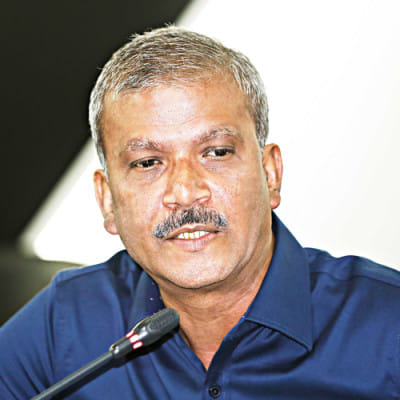
Dr. Asif Nazrul, Professor, Department of Law, University of Dhaka
The government has three organs: legislature, judiciary and executive. They have to be functional, efficient and accountable. We also need to ensure good governance. Without bringing in such fundamental changes, formulation of laws, however good, cannot protect the rivers.
India and Nepal have made significant progress in creating reservoirs while no meetings at the political level have taken place in accordance with the MoU signed between India and Bangladesh in 2011. We have been discussing the Teesta water-sharing issue with India for more than 50 years. We still do not have the rightful share of Teesta's water. Also, there has been no progress in river conservation and water-sharing since the signing of the Ganges Water Treaty of 1996 when the two countries decided to share the water of all the international rivers according to a no-harm and equitable utilisation principle. We see progress only in the case of the Feni River which happened due to the interest of India.
There are two international conventions: the 1977 Water Course Convention and the 1992 UNECE Convention. Now, any UN member state can join the UNECE Convention. If Bangladesh becomes a member of this Convention, it will be able to raise various river-related issues such as integrated resource management and basin-wide development, in a more substantive way.
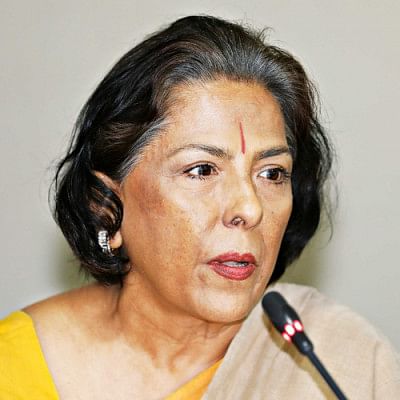
Sharmeen Murshid, Former Member, National River Conservation Commission (NRCC)
The four fundamental principles of our country are democracy, socialism, nationalism and secularism. We need to add a new principle to protect our rivers as well as the environment. A paradigm shift is needed both in terms of our political ideologies and setting the future goals.
It is unfortunate that 90 percent of rivers are being occupied, polluted and dried up because of negligence of the government. The way to solve this is to completely change the way of thinking regarding the environment. We have to hold people's representatives accountable for their stance regarding environmental and ecological issues.
If we want to make the politics of this country eco-friendly, nature-based, and river-based, we have to create a sense of compassion for rivers among the common people of the country as well. They have to be made aware of the environment and river-related laws so that they can challenge any wrong being done to the rivers.

Dr. Md. Mujibur Rahman, Former Professor, Department of Environmental Engineering, BUET
Based on a study we conducted, we recommend public disclosure of the pollution status of all rivers. This would be a very strong tool in terms of keeping citizens informed about the state of rivers. To get the rivers out of these conditions, there is also an urgent need for routine monitoring by the government and citizens. Secondly, policy intervention and industrial management interventions for curbing industrial pollution are necessary as well. The pollution is happening because of factories and industries. And while there are laws, they are not enforced.
The rate of siltation must be reduced. River banks with dense vegetation cover generally have lower siltation rates than those with sparse vegetation. While dredging rivers is important, we should not unmindfully excavate and dredge rivers.
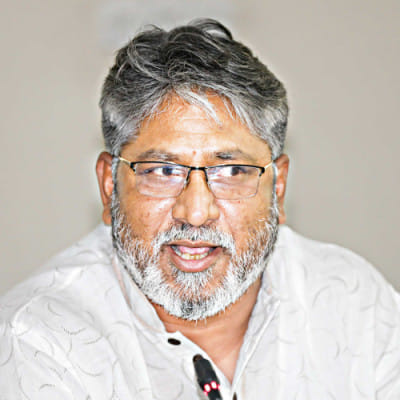
Sharif Jamil, General Secretary, Bangladesh Paribesh Andolon (Bapa)
While we talk about saving our rivers and waterbodies, there have been very few attempts in trying to protect them; instead, we are only legalising river-grabbing. If there was an actual initiative to protect our rivers, then river-grabbing would stop at some point.
We are not aware of the differences between various waterbodies and, therefore, we are recommending the same solution to all river-related problems. The government, for example, has built similar types of sluice gates for Chalan Beel and coastal rivers which do not work.
The government needs to be made aware of the economic losses caused by the pollution and grabbing of the rivers. The Joint River Commission would not be able to resolve the river pollution issues only. We need a strong regional body to address such regional problems.

ABM Imdadul Huq Khan, Advocate, Supreme Court of Bangladesh
The National River Conservation Commission Act of 2013 was revised and a new draft was formulated. This revision was required since we had rushed to make the draft following the court's order and it was not made with a rights-based approach in mind. Some of the points of the court's order were incorporated verbatim in the new draft. But the law should clearly spell out implementing mechanisms in accordance with the court's directives.
As per the law of 2013, establishing brickfields near waterbodies is strictly prohibited. But it has been observed that there are around 550 brick kilns near the waterbodies and 78 percent of all brick kilns are within 1 km radius of rivers and lakes. How did one get permission from the government to set up a brick kiln near a water body? There is no mechanism to hold government officials accountable for their negligence. Executive, legislative and judiciary need to work together to establish a strong accountability regime.
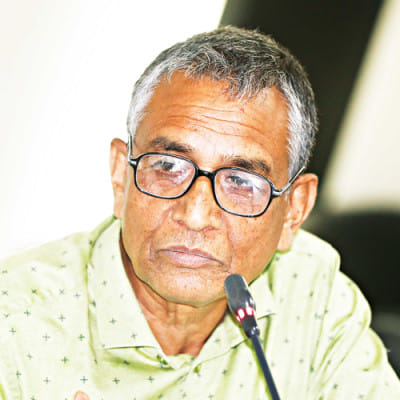
SM Mizanur Rahman, Coordinator, Save Boral Movement, Chatmohor
The Baral River, originating from the Padma at Charghat in Rajshahi, flows into the Jamuna at Baghabari in Sirajganj district through the four districts and connects with 30 rivers in Chalan Beel area. Due to faulty construction of sluice gate, cross dams and concrete roads, the river is now experiencing a slow death. We have been carrying out a movement to save the Baral River since 2008. While the movement to save the Baral River is 200,000 signatures strong, we are facing tremendous challenges. One of these is that influential people including a municipality mayor are polluting and grabbing the river. Also, there is a lack of coordination and cooperation between different ministries of the government which leads to serious damage to the rivers. We will continue our movement in the future. We need to raise a strong community voice to save our rivers.
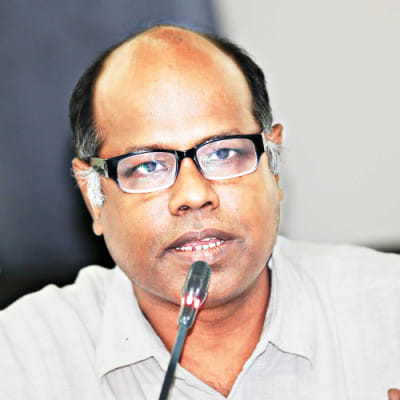
Sheikh Rokon, Founder and Secretary-General, Riverine People
The river has a deep relationship with society. Every ecosystem has a flagship feature and our flagship feature is the river. All of our ecosystems would function excellently if the rivers were fine and taken care of. But greed has led to river-grabbing for personal profits, not to mention the general pollution of rivers by dumping of waste and landfilling.
I want to highlight three points regarding how a river dies. First, a river dies culturally and loses its cultural value to people. Secondly, it dies organically due to pollution. Finally, it dies physically due to river erosion, grabbing, pollution, sand extraction, and so on.
There was a time when people used to cherish the rivers, but now the river has lost its economic and cultural value. We need to raise awareness about the value of our rivers.

Bareesh Hasan Chowdhury, Research Lawyer, Bangladesh Environmental Lawyers' Association (BELA)
Last year, BELA filed a Public Interest Litigation covering all the rivers in the country. We received an order on the PIL in November 2021. The court said three things in the order. Firstly, to identify the exact number of the rivers in our country; secondly, to liberate Turag River by demarcating the borders; and thirdly, the court asked the government to prepare a time-bound action plan for removing all encroachments from the rivers. NRCC reported that the number of encroachments is 63,000 but, if you go through their report, the actual number is 56,000. Such discrepancies cause a lack of action.
We need to codify the Polluters Pay Principle so that the polluting industries are made to pay for the pollution they inflict. Secondly, there is huge plastic pollution in our country. We need to curb the reckless use of plastics and reform our waste management system.

Manik Hossain, Community Leader
Once the Buriganga River was an integral part of our life. It was abundant in fish and other water resources. But the mouth of the Adi (original) Buriganga River was closed in 2010. As a result, the western side of the river was rapidly grabbed by land grabbers. They are also grabbing other waterbodies connected with the river. In 2019, the High Court ordered to recover the lands of the river following the CS and RS maps. But BIWTA set up demarcation pillars incorrectly which further legalised encroachment.
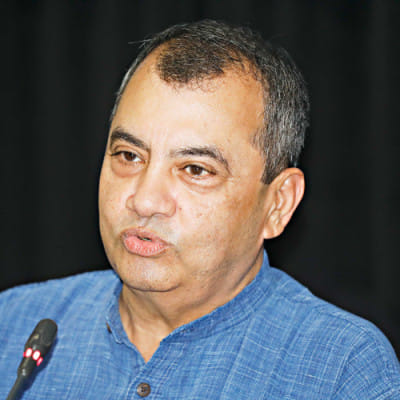
Saber Hossain Chowdhury, Chair of Parliamentary Standing Committee on Ministry of Environment, Forest & Climate Change
It is necessary to see river conservation and protection on a larger canvas. A river is not just a water body; it is also integrally connected with our overall development. If we fully realise the importance of environmental resources, we will be able to protect those resources.
In the past couple of years, 1,65,000 acres of forest land were slated to be used for development. Even the government itself is taking reserve forest lands to construct buildings, roads, and railways and establish Union Parishads. There is a lack of political understanding of the importance of the environment.
Article 18A, which focuses on the protection and improvement of the environment and biodiversity, is placed in the Fundamental Principle of State Policy section. Although fundamental principles are not judicially enforceable, they "shall be applied by the state in the making of laws, shall be a guide to the interpretation of the Constitution and of the other laws of Bangladesh." Are we properly following this constitutional obligation?
If we fail to protect our environment, we will not be able to achieve the SDGs. We need to address environmental issues within our budget and planning framework as well as in our policy statements.
Another issue is the tanneries and the pollution that they are generating. Whenever we approach these industries, they set their priorities as financial goals without due care for the environment. Chromium or chrome recovery facilities are missing as well, meaning that the tanneries operate without any provision for solid waste disposal and treatment. Government agencies have to lead by example. If a government body violates the law, how can I expect a citizen to obey it?
We do not value our natural capital. Natural capital is valued in many countries around the world. We have requested to maintain a satellite account to value our ecosystem services. We need to develop a baseline of our natural capital. We have proposed to formulate a law on ecocide to address the issues of willful destruction of the environment.
Recommendations
- Implement necessary legal reforms related to river protection while ensuring an effective accountability mechanism for the executive authority
- Strengthen and empower the National River Conservation Commission through allocation of adequate human and financial resources
- Reduce unnecessary and unplanned excavation and dredging of rivers
- Codify the Polluter Pay Principle so that the polluting industries are made to pay for the pollution they inflict
- Curb the reckless use of plastics and reform our waste management system
- Allocate adequate funds to protect our rivers and overall biodiversity
- Create a sense of compassion and consciousness for rivers among the common people of the country
- Increase civil society and community engagement to preserve rivers from illegal encroachment
- Ensure good governance and rule of law in the country to bring in fundamental changes in river management
- Convene a strong regional body to address water-sharing as well as river pollution issues across the borders

 For all latest news, follow The Daily Star's Google News channel.
For all latest news, follow The Daily Star's Google News channel. 



Comments